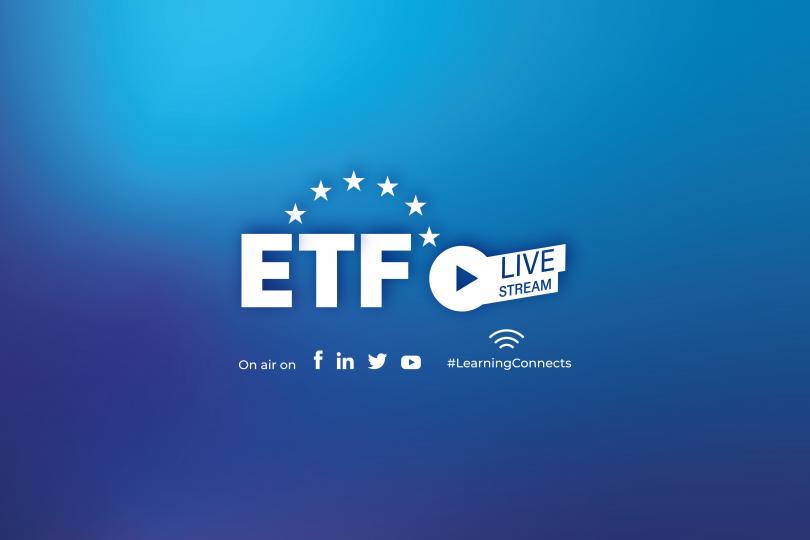
Learning Connects: Addressing the learning crisis - can partnerships help?
In a joint event Thursday, November 18 2021, the European Training Foundation and Asian Development Bank (ADB) addressed ways in which partnerships can help meet the challenges of the global learning crisis.
Part of the ETF’s November communication campaign focusing on “Networks and partnerships for change”, the one-hour online session “Addressing the learning crisis: can partnerships help?” featured guest speakers from the ADB, ETF and Philippines-based NGO, Teach for the Philippines.
Introduced and chaired by Daria Santucci, ETF Communications Officer, the session – which streamed live to an international audience on Facebook, LinkedIn and, for the first time, Twitter - began with a brief presentation on the ADB’s new book “Powering a Learning Society During an Age of Disruption.” The book, which includes a chapter written by the ETF’s Manuela Prina and Georgios Zisimos, is available as a free download here.
Sungsup Ra, Director, South Asia Human and Social Development Division, and chair of the Education Sector Group, at the Asian Development Bank, said that powering a learning society extended beyond traditional concepts of infrastructure projects and large investment programmes.
“The question is how do we build education beyond school walls,” he said. “Education is not solely the responsibility of schools and universities; more than ever before, education is everyone’s responsibility.”
People from all walks of life, and professionals from all sectors could play a part in building a learning society, he added, pointing to research by the US Brookings Institute into how even supermarkets can play a role in prompting learning conversations between parents and children while out at the shops – through, for example, posting notes such as “where does milk come from” or “what else comes from a cow?”
Clarissa Delgado, co-founder and CEO of Teach for the Philippines, noted that although there had been much focus during the global Covid pandemic on the role digital access played in enabling continuity of teaching and learning for school and college students, many countries, such as hers, had had to find novel solutions for those without access to online education.
“We work at the frontlines supporting public school teachers and students across the Philippines archipelago,” she noted. “We used a modular system that was not completely online – it included physical visits to schools and communities despite the pandemic. We have seen student reading assessments that began the year at 36 percent and ended at 98 percent. It proves that we can still teach and do our work on the ground.”
Teach for the Philippines also took a holistic approach that includes addressing the mental health wellbeing of people who often lived in isolated rural communities. During the pandemic the NGO focused on the teaching of literacy and numeracy – often involving parents, many of whom in such communities could not read or write themselves.
Georgios Zisimos, Head of Policy Advice and EU Programming Unit, ETF, observed that internationalisation of approaches to education and training had become firmly a part of EU objectives over the years and now often formed an integral part of various treaties.
“Partnerships are now a fundamental way of doing business in education and training. Our experience of working with countries in the EU neighbourhood proves there is a need for this. In building partnerships, you look for a win-win situation.”
Examples of ways in which international cooperation can be of mutual benefit could be seen in the ETF’s own work, in networks such as its Community of Innovators, of Network of Centres of Vocational Excellence, he added.
Clarissa said that the value of international experience to her work was in the way it could be tailored to address local challenges.
“We have been able to contextualise learning from international sources for our teachers. I am an Obama Fellow and we work closely with them. We also work with the Asia Society and Teach for All. We attend online conferences and network with education professionals across the world and bring those learnings back and contextualise them for the things we learn on the ground here.”
Sungsup added that the Covid pandemic had been, “like a wake-up call for all of us to work together, to cooperate during periods of disruption.”
“There is a need to reach out to improve the quality of learning systems. Many students have not been able to go to school – the only way has been online, but the pandemic has also brought attention to the lack of access to online devices for many, particularly in disadvantaged communities.
“Covid 19 really tells us to reform education to help support societal problems that threaten the security of education; museums, libraries, art galleries – all can play a role in supporting education.”
To see the full interview:
Did you like this article? If you would like to be notified when new content like this is published, subscribe to receive our email alerts.